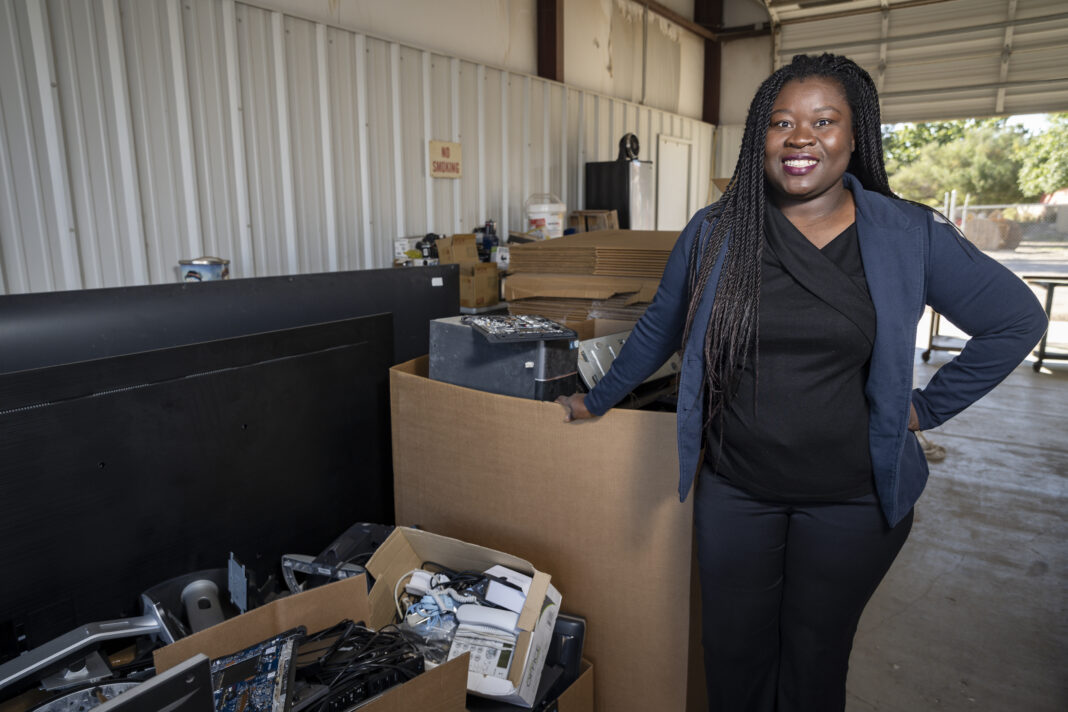She’s a “Jersey” girl, who was once a pre-law student. But Odessa’s Rachel Koranteng found her true calling working with household hazardous waste.
For the past six years, Koranteng has served as supervisor of the city’s Household Hazardous Waste Program. It’s a job she’s passionate about.
“I find it very exciting and rewarding,” Koranteng said. “With global warming becoming a greater concern, I’m glad we have a program to help residents responsibly eliminate hazardous house waste.
“I like recycling things and putting them back into the community.”
The household hazardous waste program is located at the city’s recycling center, 816 W. 42nd St. Hours of operation are 4 p.m. to 9 p.m., Tuesday through Friday and 9 a.m. to 2 p.m. on Saturdays.
City residents are encouraged to drop off their “waste,” which can include partially used cans of paint, anti-freeze, mercury and motor oil, most of which can be recycled and reused, Koranteng said.
It’s also a drop-off spot for old computers, cell-phones TVs, furniture and electrical appliances like washers, dryers and refrigerators — even old mattresses, “which contain lots of chemicals,” Koranteng said.
Better yet, the program is free. Residents are not charged for their drop-offs and the recycling center doubles as a free “store” where people can stop by and grab a discarded TV, computers, cans of paint, or piles of mulch from tree limbs that have been shredded.
“We have people who visit regularly just to shop for things they might be able to use,” Koranteng said.
For more information contact Koranteng at (432) 368-3546 or visit tinyurl.com/5xaadbc3.
Koranteng estimates that about 90 percent of what residents drop off can be recycled or repurposed. Some toxic chemicals have to be shipped off to companies that can dispose of them properly.
“We have a company that picks up our cooking oil,” Koranteng said. The company processes the oil and reuses it for diesel fuel.”
A native of Ghana, Koranteng’s family moved to the U.S. and settled in New Jersey when she was 10.
After graduating high school, she earned a bachelor’s degree in history from the University of Pittsburgh. Initially, Koranteng was a pre-law major, but after giving birth to twins, she put that goal on hold.
Koranteng soon realized that she had a strong interest and was even more passionate about the environment and recycling. It didn’t hurt that her husband is an engineer in the oil industry.
When the Korantengs relocated to Odessa, Rachel Koranteng found an opportunity to pursue her passion for recycling with the city.
Koranteng is the first to admit, one of the biggest challenges of her job has been to educate and motivate Odessa residents to recycle.
“When I first moved here, I noticed a lot of people didn’t see recycling as a priority,” Koranteng said. “In New Jersey it’s enforced, so we just did it.”
Under Koranteng’s leadership, the city’s household hazardous waste program has grown and flourished, city officials say.
For example, in 2020, with COVID raging, more than 13,200 pounds of paint were dropped off at the recycling center, but 13,000 pounds, or 1,200 gallons was recycled back into the community. Prior to 2020, the amount of paint collected and recycled had grown to double that amount — a figure Koranteng expects to reach again by the end of 2021.
Prior to COVID-19, Koranteng frequently visited classrooms to teach students about ways they can protect the environment and how to recycle. She also offered community education programs at her job site which has a small classroom.
Due to COVID’s lingering, Koranteng hasn’t been able to resume the in-person programs, but she still communicates with various teachers and helps them incorporate recycling information into their class curriculum.
“I’ve seen a big improvement,” Koranteng said. “A lot of it has to do with educating people and teaching them how to recycle.
“That makes me feel proud. I want us all to be proud of living in a clean community.”




